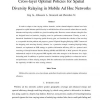Free Online Productivity Tools
i2Speak
i2Symbol
i2OCR
iTex2Img
iWeb2Print
iWeb2Shot
i2Type
iPdf2Split
iPdf2Merge
i2Bopomofo
i2Arabic
i2Style
i2Image
i2PDF
iLatex2Rtf
Sci2ools
TWC
2008
2008
Cross-Layer Optimal Policies for Spatial Diversity Relaying in Mobile Ad Hoc Networks
In order to adapt to time-varying wireless channels, various channel-adaptive schemes have been proposed to exploit inherent spatial diversity in mobile/wireless ad hoc networks where there are usually alternate next-hop relays available at a given forwarding node. However, current schemes along this line are designed based on heuristics, implying room for performance enhancement. Thereby, to seek a theoretical foundation for improving spatial diversity gain, we formulate the selection of the next-hop as a sequential decision problem and propose a general "Optimal Stopping Relaying (OSR)" framework for designing such next-hop diversity schemes. As a particular example, assuming Rayleigh fading channels, we implement an OSR strategy to optimize information efficiency (IE) in a protocol stack consisting of Greedy Perimeter Stateless Routing (GPSR) and IEEE 802.11 MAC protocols. We present mathematical analysis of the proposed OSR together with other strategies in the literatur...
| Added | 16 Dec 2010 |
| Updated | 25 Apr 2011 |
| Type | Journal |
| Year | 2008 |
| Where | TWC |
| Authors | Jing Ai, Alhussein A. Abouzeid, Zhenzhen Ye |
Comments (0)




